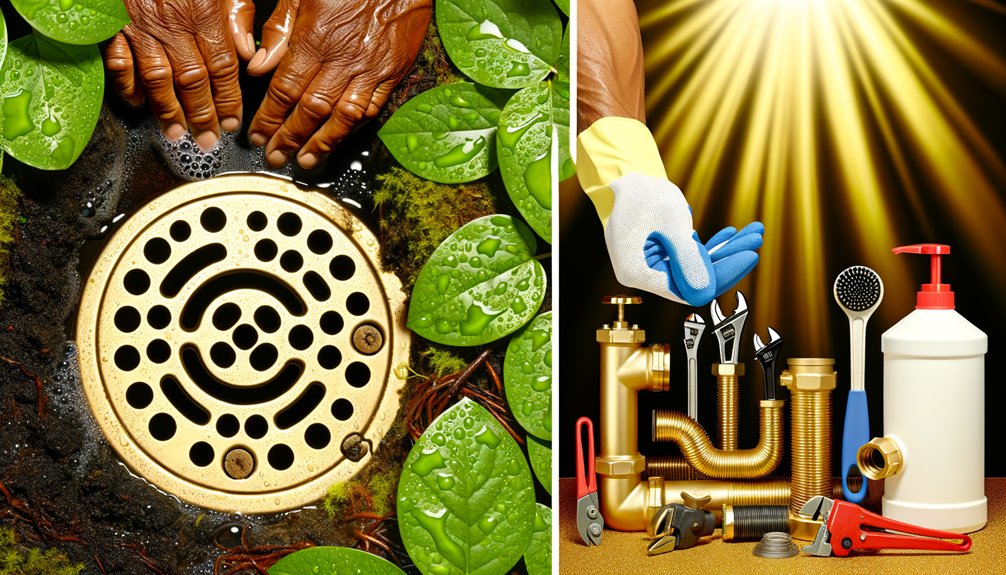Effective drain preventative maintenance is essential for plumbing longevity. Homeowners should be cautious about what enters drains, avoiding oils, fats, and inappropriate items. Regularly flushing drains with hot water helps dissolve grease and debris build-up. Weekly cleaning with baking soda and vinegar prevents accumulation of organic materials. Utilizing natural cleaning solutions enhances drain cleanliness. Finally, investing in yearly professional drain cleaning services can efficiently address deeper issues and guarantee peak functionality. Further insights on maintenance practices await exploration.
Be Careful What Goes Down Your Drains

When homeowners fail to contemplate what they dispose of down their drains, they often inadvertently contribute to plumbing problems. To maintain ideal drain health, it is vital to be careful what goes down your drains. Liquid fats, oils, and grease should always be disposed of in sealed containers, as they can solidify and lead to significant clogs. Similarly, coffee grounds, eggshells, pasta, rice, and cat litter can catch on debris, creating larger blockages. Flushable wipes, despite their labeling, can also pose serious plumbing issues due to their inability to break down. Regularly educate household members about these disposal guidelines to prevent future clogs. By adhering to these practices, homeowners can keep their drains and pipes flowing smoothly, ensuring effective drain maintenance and minimizing the risk of costly repairs.
Flush Your Drains With Hot Water
Flushing drains with hot water serves as an effective preventative measure against clogs and blockages. Regular maintenance through this method helps dissolve and remove built-up grease, soap scum, and food particles, considerably reducing the risk of clogged pipes. It is essential to use hot water—avoiding boiling temperatures—to prevent potential damage to PVC pipes, which can warp or leak under excessive heat. A sufficient amount of hot water should be poured down the drain once a month to maintain clear pipes. For enhanced results, combining hot water flushing with natural cleaning agents such as baking soda and vinegar can optimize drain cleanliness. Consistent hot water flushing not only minimizes the accumulation of fat, oil, and grease (F.O.G.) but also extends the lifespan of the plumbing system. These tips are vital for anyone seeking to liberate their drains from the burden of persistent blockages.
Clean Your Drains Weekly

Maintaining clean drains on a weekly basis is essential for preventing the accumulation of grease, food particles, and debris that can lead to serious clogs. Implementing simple maintenance tips can greatly enhance the efficiency of plumbing systems. A recommended method involves using a mixture of ½ cup baking soda followed by ½ cup vinegar, which should be poured down the drain. After plugging the drain for one hour, flushing with boiling water will help keep the pipes clear of obstructions. This natural solution is effective and avoids the risks associated with harsh chemicals that can damage plumbing. Regularly cleaning drains not only prevents clogged drains but also minimizes unpleasant odors caused by stagnant waste. Consistent preventative maintenance can save homeowners time and money by reducing the likelihood of requiring a professional plumber to address severe clogs. Adopting this routine fosters a more liberated and efficient plumbing environment.
Use Natural Cleaning Solutions
Utilizing natural cleaning solutions is an effective strategy for maintaining drain hygiene and preventing clogs. A mixture of baking soda and vinegar, when combined in equal parts (½ cup each), can effectively break down organic buildup in drains. Allowing this solution to sit for one hour before flushing with hot water enhances its efficacy. Periodic flushing with hot water can also help melt and remove grease or oil deposits that accumulate within pipes. Additionally, enzyme-based cleaners, such as Green Gobbler, utilize microorganisms that consume organic waste, ensuring clogs are prevented without toxic chemicals. For improved results, combining baking soda with salt (½ cup each) and letting it sit for 30 minutes before rinsing with hot water can further maintain pipe health. Incorporating lemon juice with baking soda (½ cup each) not only cleans but also deodorizes drains, providing a fresh scent.
Invest In Yearly Drain Cleaning Services

Although homeowners may overlook the importance of routine maintenance, investing in yearly drain cleaning services is crucial for preventing clogs and extensive plumbing issues. Regular professional drain cleaning not only addresses accumulated debris but also includes essential assessments of drains and pipes through advanced techniques like video inspections. This proactive approach facilitates early detection of potential problems.
| Benefits of Yearly Drain Cleaning | Impact on Household Drain Health |
|---|---|
| Reduces risk of clogs and damage | Maintains ideal flow |
| Utilizes plumber's snake technology | Prevents costly blockages |
| Cost-effective in the long run | Extends plumbing system lifespan |
| Minimizes need for emergency repairs | Guarantees efficient operation |
Frequently Asked Questions
What Is the Best Preventive Drain Maintenance?
The best preventive drain maintenance involves a combination of DIY solutions and professional services. Homeowners are advised to implement a maintenance schedule that includes regular drain cleaning using enzyme-based products, such as Green Gobblers, to address common clogs. Incorporating plumbing tools, like a plunger or snake, can aid in minor blockages. Additionally, seeking professional services annually for thorough inspections guarantees long-term pipe health, preventing costly repairs and maintaining peak drainage functionality.
Do Enzymatic Drain Cleaners Really Work?
When considering whether enzymatic drain cleaners truly work, one must separate fact from fiction. Enzyme effectiveness hinges on bacterial breakdown of organic materials, proving superior to many drain cleaning myths. Natural alternatives like these promote environmental impact reduction. Product comparisons indicate long-term benefits, especially when usage instructions are followed diligently. Regular application can minimize clogs, offering a proactive solution for drain maintenance and aligning with sustainable practices embraced by environmentally-conscious consumers.
Why Do Plumbers Say to Not Use Drano?
Plumbers advise against using Drano due to its potential for pipe damage and long-term effects on plumbing systems. The chemical dangers associated with Drano can exacerbate clogged drains, leading to costly repairs. Furthermore, the harsh ingredients pose environmental risks, prompting a preference for eco-friendly solutions. Drano alternatives, such as enzyme-based products, offer safer drain cleaning options that address root causes without the harmful repercussions of traditional chemical cleaners, debunking common plumbing myths.
What Is the Best Thing to Keep Drains Clear?
When it comes to keeping drains clear, an ounce of prevention is worth a pound of cure. Regular drain cleaning combined with a proactive maintenance schedule can greatly reduce clogs. Incorporating natural remedies like baking soda and vinegar is effective, while adopting smart kitchen habits and bathroom practices guarantees clog prevention. Additionally, regular inspections of plumbing can identify potential issues before they escalate, promoting a free-flowing drainage system and enhancing overall plumbing health.


